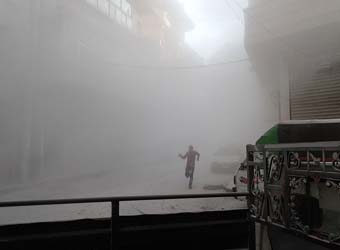The United Nations said on Monday the suffering of civilians in Syria has worsened since it called for a ceasefire six days ago in a humanitarian initiative that was rapidly derailed by an even more intense bombardment.
Fighting has involved pro-government air strikes on the opposition enclave in eastern Ghouta outside Damascus, an offensive against rebels in the northwestern Idlib province and Turkey’s assault on the Kurdish-held Afrin region.
“The call for an immediate cessation of hostilities… has gone unanswered,” the United Nations resident and humanitarian coordinator in Syria Ali al-Za‘tari said of the Feb. 6 appeal.
The conflict also threatened to escalate on another front on Saturday, with Israel launching its heaviest air strikes yet against Iranian targets in Syria after Syrian air defenses shot down an Israeli F-16, though tensions have since been contained.
Surging violence has led to reports of “hundreds of civilian deaths and injuries, massive displacement and the destruction of civilian infrastructure, including medical facilities,” Za‘tari said in a statement.
He described it as “some of the worst fighting of the entire conflict”, a war that is entering its eighth year and has killed hundreds of thousands of people and driven millions from their homes.
Since Russia entered the war on the side of President Bashar al-Assad and his Iranian and Shi‘ite militia allies in 2015, the government has reclaimed large areas including all the big rebel bastions in Syria’s main cities.
However, while rebel hopes of ousting Assad by force appear thwarted, and while major offensives last year took back most ground held by Islamic State, the multi-sided war still has the potential to spiral out into new conflicts.
Turkey’s offensive in Afrin pits it against the Kurdish YPG militia, which also holds swathes of land in northeast Syria supported by Ankara’s NATO ally Washington.
In the southwest, the downing of an Israeli jet by Syrian anti-aircraft fire on Saturday underscored the possibility of a wider escalation between Israel and Iranian-backed forces in Syria, including Lebanon’s Hezbollah group.
“The military escalation throughout Syria, including the events we have seen on the Israeli border over the weekend, is deeply worrying. It could indeed lead to a dangerous spillover,” a spokeswoman for the European Commission said on Monday.
‘HUNDREDS OF CIVILIAN DEATHS’
U.S. Secretary of State Rex Tillerson is visiting Jordan and Turkey this week as part of a Middle East tour to discuss issues that include Syria. U.N.-led diplomacy toward ending the conflict is making little or no progress.
The Kremlin said on Monday that U.S. support in stabilizing Syria had been inadequate, but without spelling out how. “There is a shortage of this help,” spokesman Dmitry Peskov said.
On Saturday, U.N. rights chief Zeid Ra‘ad al-Hussein said that Syrian and Russian airstrikes in rebel-held areas of Idlib and eastern Ghouta had killed 230 civilians in the past week and that they might constitute war crimes.
The Syrian Observatory for Human Rights, a Britain-based war monitor, said on Monday that air strikes had killed 15 more civilians, including three children, and injured another 85 in eastern Ghouta since Saturday.
“I am again appealing to all parties, and those with influence over them, to listen to us and to the affected population: end this intolerable human suffering,” Za‘tari said.
The United Nations called on Feb. 6 for an immediate humanitarian ceasefire of at least a month across the country.
More than 700 patients in the besieged Damascus enclave of eastern Ghouta now await medical evacuation, said Elizabeth Hoff, World Health Organisation (WHO) representative in Syria.
The WHO, a United Nations agency, has sent 11 requests to the Syrian foreign ministry since last May, but only 29 of the most critical cases were evacuated in late December, Hoff said. The Jaish al-Islam rebel group released 29 detainees in eastern Ghouta at the time, as part of a deal with the government.
“This is a political issue which cannot be resolved with humanitarian efforts,” Hoff told Reuters in Geneva on Monday, speaking from Damascus. “Unfortunately the list of patients is only growing.”
“The security situation is very bad, there are not sufficient medical teams on the ground. They haven’t got supplies. We have not been able to deliver anything since November 28,” she added.


